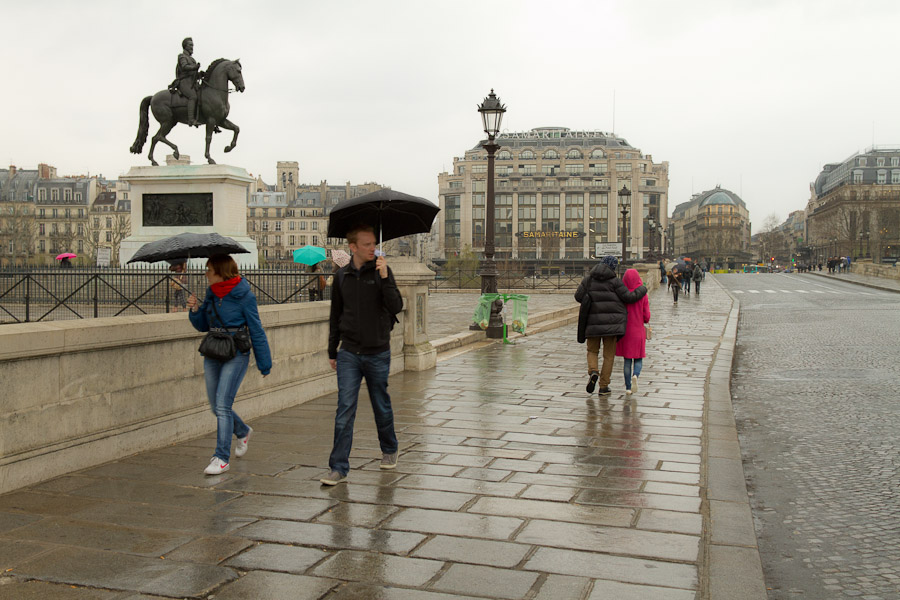First, just a nod to the eighth record temperature in a row that Chicago just set. Tom Skilling's blog entry this morning maps out the carnage, including record pollen levels, the hottest lake temperature readings ever for this time of year, and a forecast for above-average temperatures going into April. Let me tell you how thrilled I am that we've skipped spring and gone straight to July. As my servers start to melt and I lose sleep because the house is too hot, I find myself wishing for autumn the day after the March equinox.
It's not that warm in Paris. Here's another view of the Pont Neuf, which I like a little better than the one I posted Sunday:

And thank you, Eurostar, for making this all possible:

Happy Spring. The equinox happened less than 11 hours ago, which usually means Chicago has another six weeks of cold and damp weather. Not this time. Trees have buds and flowers, insects have started buzzing around, and as of about an hour ago, we've broken (or tied) our seventh consecutive heat record. This, by the way, is also a record (greatest number of temperature records broken consecutively), breaking the record set...yesterday.
Here are the temperature records we've set so far this month:
| Date |
Old record |
New record |
| March 14 |
25.0°C, 1995 |
27.2°C |
| March 15 |
23.3°C, 1995 |
27.2°C |
| March 16 |
25.6°C, 1945 |
27.8°C |
| March 17 |
23.3°C, 1894, 2009 |
27.8°C |
| March 18 |
23.3°C, 1903, 1918, 1969 |
27.2°C |
| March 19 |
25.6°C, 1921 |
25.6°C (tie) |
| March 20 |
24.3°C, 1921 |
25.0°C as of 10:53am |
Today's forecast high would make it feel more like mid-June than mid-March.
Meanwhile, it's snowing in Arizona...
Update: O'Hare temperature is 28.9°C at 13:51.
Apparently I've missed some unprecedented weather back home this weekend:
Saturday's high temperature at Chicago's official O'Hare International Airport observing site hit 28°C—the unprecedented fourth consecutive day in the 80s [Fahrenheit]. Sunday's anticipated 29°C high will make it a record 5 straight 80-degree days. Weather records dating back to 1871 should continue to fall as Chicagoans experience a stretch of warm temperatures never before observed in March. Sunday will mark the 6th straight day of 70-degrees or higher, eclipsing the previous record 5-day run on March 12-16, 1995.
The other shoe will drop mid-May or early in June. After the previous 5-day record in 1995, we experienced the hottest summer on record. The lake never froze over this year, and right now it's 6°C warmer than usual, so it won't hold off the summer heat effectively.
I'm afraid. I'm very afraid.
As of 13:51 CDT, the official temperature at O'Hare hit 26°C, passing the previous March 14th record by a degree. Will it get warmer?
The high temperatures at O'Hare the last three days have been
21°C,
18°C, and
21°C, all of them very close to the normal temperatures for mid-May. Right now it's 21°C, and forecasters expect record temperatures today and tomorrow (with a brief interlude tomorrow afternoon as temperatures plummet 11°C for a few hours).
The record high for March 14th is 25°C, set in 1995, during Chicago's longest string of 21°C-plus temperatures in history (5 days, from March 12 to 16). With a forecast (record!) high of 27°C tomorrow (beating the record of 23°C, also set in 1995), it's more like June than March.
Not to beat the drum or anything, but warm springs usually lead to really hot summers. Expect whinging from The Daily Parker in about two months.
I've never felt great about the Daylight Saving Time switch happening in the beginning of March, but here it is. Oddly, I have no trouble changing eleven or twelve time zones, but the one-hour change in the spring (but not the fall) always messes me up.
Anyway, if you live in the U.S. or Canada (excluding Arizona and Saskatchewan), it's probably an hour later than you think it is.
In general, people using words they don't understand, presumably to sound smart, drives me up a tree. In specific, I wish against reason that more people knew how time zones worked. Microsoft's Raymond Chen agrees:
One way of sounding official is to give the times during which the outage will take place is a very formal manner. "The servers will be unavailable on Saturday, March 17, 2012 from 1:00 AM to 9:00 AM Pacific Standard Time."
Did you notice something funny about that announcement?
On March 17, 2012, most of the United States will not be on Standard Time. They will be on Daylight Time. (The switchover takes place this weekend.)
Now, I'm one of the few people in the world who has implemented a complete time zone package for Windows systems, and regular readers will already know about my vocal defense of the Olson/IANA time zone database. So I don't expect most people to know the ins and outs of time zone abbreviations. But this is the point Chen makes, and I would like to make: if you don't know what you're writing, don't write it. Say "Central time" or "local Chicago time" instead of "Central Standard Time," if for no other reason than you'll be wrong about the latter 8 months out of the year.
We have our first really great spring day—it's 18°C and sunny—and I'm inside. It's also the warmest day we've had since November 13th (21°C).
That is all. Back to the mines.
While Chicago finished its ninth-warmest (meteorological) winter in history on February 29th, Illinois as a whole finished its third warmest:
This year the average winter temperature was 1.2°C, 2.9°C above normal, and the third warmest winter on record. Here are the top four warmest winters. As you can see, we had a two-way tie for second place.
- First place, the winter of 1931-32 at 2.8°C;
- Second place, a tie between 1997-98 and 2001-02 at 1.4°C;
- Third place, this winter at 1.2°C.
Not only was it warm in terms of the average temperatures, but this winter lacked the really cold weather. Only a few place had temperatures drop below zero [Fahrenheit, -17.2°C]. The coldest reading for the winter was a mere -21°C at both Galena and Elizabeth in the far northwestern corner of the state.
Chicago had no days below zero Fahrenheit, thanks to the inland sea next to us.
We're now looking forward to a warm and wet spring...
That's where Chicago found itself today, inside the warm, dry southern sector of a major winter storm. The temperature got up to 15°C, with 65 km/h wind gusts, but as the cold front has pushed through behind the dry wedge, temperatures have fallen 6°C in the last three hours.
Still, today we finish the 10th warmest winter in recorded history:
Meteorological winter finishes as it began in Chicago---milder than normal. The three month season is noteworthy on a number of fronts. It's the mildest winter in 14 years and has posted more 40-degree (Fahrenheit) and warmer temperatures than any winter in the 80 years since 1931-32. It also ranks 10th mildest of the past 142 winter seasons.
Each of the three months of soon-to-close meteorological winter 2011-12 have posted temperature surpluses. February becomes the fifth consecutive month in Chicago to finish with temperatures which have averaged above normal. And as if that's not impressive enough, a stunning 76 of this winter season's 91 days—84 per cent of them—have finished at or above normal!
Climatologists predict that spring will be warm and wet as well. I can definitely get used to winters like this, though.